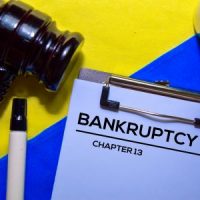Reasons To Choose Chapter 13 Bankruptcy

After deciding to file for bankruptcy, one of the most crucial things you can do is choose the right type of bankruptcy to file. Choosing between a Chapter 7 and Chapter 13 bankruptcy depends on individual goals and circumstances. If you are considering filing for bankruptcy, you should know that selecting which type of bankruptcy to file is a complex decision. It is best to consult a qualified bankruptcy attorney who can assess your situation and help you determine the best option. However, in the end, the choice of whether to file a Chapter 7 or Chapter 13 bankruptcy is entirely up to you.
There are countless reasons why debtors file a Chapter 7 or Chapter 13 bankruptcy. Below, we look at some of the possible reasons for choosing a Chapter 13 bankruptcy.
- Not Eligible for Chapter 7
One of the main reasons someone would choose to file a Chapter 13 bankruptcy is because they are not eligible for Chapter 7 bankruptcy. You must pass the means test to qualify for Chapter 7 bankruptcy. The mean test confirms whether your earnings are below the median income. If you have an income which is above the state’s median income, you do not qualify for Chapter 7 bankruptcy.
- Asset Protection
A Chapter 13 bankruptcy can allow a debtor to keep non-exempt property. In Chapter 13 bankruptcy, you keep your non-exempt property in exchange for repaying creditors through the structured repayment plan. This is different from what happens in Chapter 7 bankruptcy. With Chapter 7 bankruptcy, the trustee sells the debtor’s non-exempt property to repay debt.
- Attorney Fees Can Be Paid Over Time
The biggest challenge facing people who want to file for bankruptcy is finances. Raising the money to pay a bankruptcy attorney can be challenging. With a Chapter 13 bankruptcy, paying attorney fees over time through the Chapter 13 repayment plan may be possible.
- Less Harsh on Credit Reports
Another major reason people choose Chapter 13 bankruptcy is that this option is less harsh on credit reports. After you file for bankruptcy, the filing is included in your credit report. This information can be accessed by anyone who pulls your credit report. How long your bankruptcy remains on your credit report depends on the type of bankruptcy you file. Chapter 7 bankruptcy remains on a filer’s credit report for up to ten years, whereas Chapter 13 stays on your credit report for up to seven years.
- Co-Debtor Protection
If you have a co-debtor, you may want to consider filing Chapter 13 bankruptcy. Chapter 7 bankruptcy eliminates liability for the filer, but creditors can still pursue repayment from a co-debtor. In Chapter 13 bankruptcy, the co-debtor stay prevents creditors from pursuing repayment from a co-debtor while the repayment plan is in effect.
- You Want To Repay Debt
Lastly, some debtors choose Chapter 13 bankruptcy to fulfill their repayment obligations, or at least the portion they can. With Chapter 13 bankruptcy, you can repay your debts by making monthly payments in a three- or five-year plan.
Contact a Lehighton & Carbon County Bankruptcy Attorney Today
If you need help determining whether Chapter 13 bankruptcy is the right option for you, contact our skilled Lehighton & Carbon County bankruptcy attorney at Adam R. Weaver, Esq.
